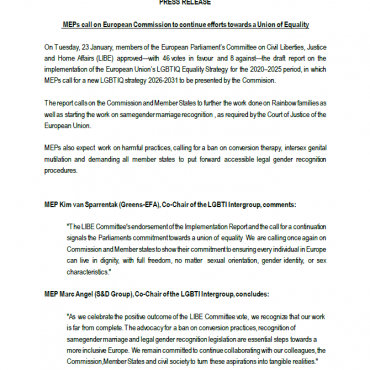MEPs welcome new gender change law in Portugal; concerned about Lithuania
Members of the European Parliament have reacted to recent developments in national laws affecting transgender people.
 On 16 March 2011, the new Law establishing procedures for change of name and sex in the civil register (PDF) came into force in Portugal. The new law does not require divorce, sterilisation, hormonal treatment or surgery to officially change gender, while a medical diagnosis will remain necessary.
On 16 March 2011, the new Law establishing procedures for change of name and sex in the civil register (PDF) came into force in Portugal. The new law does not require divorce, sterilisation, hormonal treatment or surgery to officially change gender, while a medical diagnosis will remain necessary.
The new law is fully in line with the Yogyakarta Principles, a set of authoritative guidelines for the application of internal human rights standards in the field of gender identity and sexual orientation.
Rui Tavares, Member of the European Parliament from Portugal and Vice‑President of the LGBT Intergroup, commented: “I am proud that colleagues in Lisbon ended the legal uncertainty surrounding gender reassignment procedures. Portugal keeps leading the way as a progressive country for LGBT people in Europe, and transgender citizens can now benefit from one of the most progressive laws in the world.”
In contrast, on 8 March 2011 Members of Parliament in Lithuania tabled a proposal to outlaw gender reassignment surgery.
The bill proposed by Antanas Matulas MP, Chairman of the Committee on Health Affairs, would prohibit doctors and surgeons from performing gender reassignment operations. This would constitute an insurmountable obstacle for transgender persons in the country.
Raül Romeva i Rueda MEP, Vice-President of the LGBT Intergroup, reacted: “Some Lithuanian Members of Parliament make it sound as if they are under siege by transgender people, when all they need is accessing essential healthcare to protect their human dignity. How the European Union can intervene is currently unclear, but we will use of our mandate to the greatest possible extent to stop this ban from becoming law.”
The LGBT Intergroup will continue monitoring developments in Lithuania regarding gender reassignment procedures, legal recognition of transgender people’s identities, and freedom of expression.






